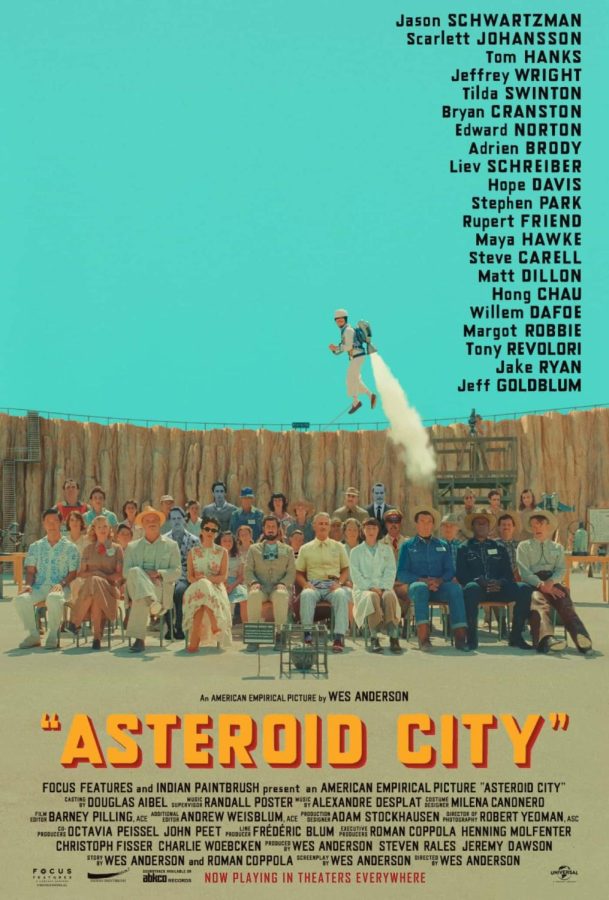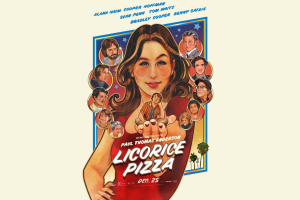Existence According to Wes Anderson
‘Asteroid City’ is an out of this world contemplation on the many stages of life
June 30, 2023
Set in a fictional southwestern desert town with a population of 87, Wes Anderson’s “Asteroid City” is an expansion of his world-building. In Asteroid City circa 1955, a Junior Stargazer Convention brings four young geniuses, their families and an elementary-grade classroom together in a desert landscape, mere miles from a location where atom bomb tests are being conducted.
The film is metatextual in two ways: first with its back-and-forth, black-and-white broadcast narrating the creation of the play “Asteroid City” written by an acclaimed, fictional playwright, Conrad Earp (Edward Norton) and second with Anderson’s marriage between absurdity and existentialism. In three acts, Anderson’s distinctly deadpan humor and three-pronged narration explores what people mean when they think of life “beyond.”
In Asteroid City, there are the character’s lives beyond the city, the character’s relation to the afterlife and non-actor life, and questions of life beyond the planet entirely. Beyond the small town of Asteroid City, there are shreds of larger lives — mainly those of the movie star, Midge Campbell (Scarlett Johansson), and recently widowed war photographer and father of four, Augie Steenbeck (Jason Schwartzman). What ties all of the characters together — the military scientists, the schoolteacher (Maya Hawke), the abnormally-intelligent junior space cadets, the parents of these geniuses, the actors that play them in the play, along with the director Schubert Green (Adrien Brody) — is their longing for purpose and fear of loneliness. This begs the question: What is there beyond this place, this time, this life?
In particular, Clifford (Aristou Meehan), one of the four honorees at the convention and a young inventor, touches on the purpose of existence and why proving its necessity is always relevant. His signature line is “do you dare me?” because he feels a need to prove his existence. In Act III of the film, Clifford admits he always asks people to dare him to try absurd “experiments,” such as climbing a cactus or jumping off of a motel bungalow Anderson connects to Clifford’s desire to understand life’s meaning by showing us over and over again that the meaning of life cannot be singularly proven— so maybe we should laugh at the notion of it and go on feeling what we can in each moment.
Throughout the film there are meditations on progress, religion, time and, most importantly, fear. Regarding fear, the citizens worry that following an alien’s brief appearance in Asteroid City their lives will never be the same — and they were right. Augie’s son, Woodrow Steenbeck (Jake Ryan) points out the impossibility of normalcy in life, adding that just forgetting what may be beyond planet Earth in this context, is impossible. Whether advertently or inadvertently, Anderson calls out the toxicity of post pandemic ignorance, the confusion of government quarantine mandates, and the hurry to say “the past has passed.”
The existentialism, however, is painted over with Anderson’s usual tricks: yellow and blue pastel tones, the children taking initiative over the adults, and colloquial phrases glossing over Augie’s grief and blatantly admitting to Midge’s life being wracked with abusive relationships. It’s rare that the character’s internal battles don’t become the punchline for a joke rather than a moment to fully meditate upon.
Anderson’s films portray more than his distinguished way of looking at the world: He can connect with his audience through depthful characters, striking scenes, and an always catchy score that may translate as lacking to some and meditations on life’s meaning to another.
There is no battle over the stage or question of acting chops amongst the star-studded cast of “Asteroid City.” In my opinion, though, the star of this film is Schwartzman’s portrayal of both Augie and the actor that plays Augie in the play, Jones Hall. As it would be in Anderson’s world, a scene where Augie burns his hand on a quickie grill is the butt of a joke, but also emphasizes the existentialist throughline of the film. Schwartzman maintains his characters’ disorientation in both of their endearing and thought-provoking mannerisms.
Still though, “Asteroid City” was met with mixed praise and criticisms of “emptiness.” Anderson’s films are often met with an amalgam of responses because he has such a distinct style: bringing his films into a philosophical sphere with quirky jokes riddled throughout, will not be something everyone will resonate with. Those expecting a gratifying aestheticism further popularized by the Tiktok trend drawing from Anderson’s typical film style will see that on full display in “Asteroid City” — but they will also receive a giggle-eliciting, thought-provoking experience.
Anderson’s films portray more than his distinguished way of looking at the world: He can connect with his audience through depthful characters, striking scenes, and an always catchy score that may translate as lacking to some and meditations on life’s meaning to another.
The film debuted in a limited capacity on June 16 in theaters in New York and Los Angeles before its nationwide release on June 23. I went to see “Asteroid City” at the AMC 13 at Lincoln Square upon its immediate limited release on June 15 and was overwhelmed with all I wanted to say about the nuances of Wes Anderson’s storytelling. I rarely rewatch films but I bought a ticket to see “Asteroid City” again a few days later on June 19 because I could not stop thinking about it. I was never bored throughout either viewing and may have even enjoyed my second time in the theater more. That is to say, Anderson’s recent project is equally out of this world a second time around.
“Asteroid City” is currently playing in theaters nationwide and can be viewed at the local AMC Lincoln Square 13 theater near Fordham’s Lincoln Center campus.














